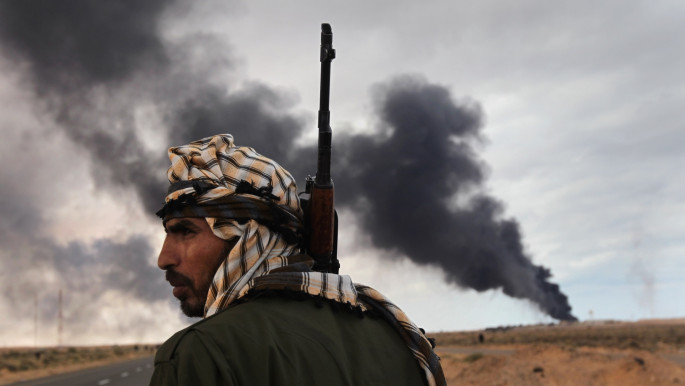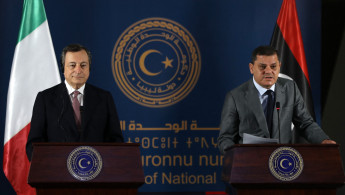Dbeibah and Draghi: A new era in Italy-Libya relations
During a joint press conference with his Libyan counterpart, Abdul Hamid Dbeibah, Draghi told reporters that Italy wants "to rebuild the ancient friendship and closeness" between the two countries.
Dbeibah was sworn in as prime minister of the Government of National Unity (GNU) on 15 March, after receiving a vote of confidence from the Libyan House of Representatives (HoR).
The new government represents a potential end to the 10-year war in Libya since Muammar Gaddafi's fall. Italy has so far played a crucial role in the country, keeping its Tripoli embassy open throughout the conflict.
Draghi's visit to Libya aimed to kickstart a "new course" in the relationship between the two countries, according to Italian pro-government media. During his visit, the leaders talked about "cooperation in energy, infrastructure, health, and culture," said the Italian PM.
But questions still remain as to whether Dbeibah could be the leader to boost ties with Italy, and if Rome's diplomatic strategy will prove more successful than the hard military power utilised by other foreign actors such as Egypt, Russia, the UAE, and Turkey.
 |
Mario Draghi's visit to Libya aimed to kickstart a 'new course' in the relationship between the two countries |  |
Karim Mezran, director of the North Africa Initiative and senior fellow with the Rafik Hariri Center and Middle East Programs at the Atlantic Council, told The New Arab that this is the moment to give diplomacy a chance in Libya.
In April 2019, the self-proclaimed Libyan National Army (LNA) – led by warlord Khalifa Haftar and supported mainly by the UAE, France, Egypt, and Russia – launched an offensive against the UN-recognised Government of National Accord (GNA), in order to take over the capital Tripoli.
 |
|
| Read more: Divided Europe: How the West lost influence in Libya's war |
"If the UAE and Egypt had succeeded in supporting Haftar's campaign - making a clean sweep of any diplomatic hypothesis - there wouldn't be any Dbeibah government at all," Mezran said.
"Turkish intervention was decisive, because only the military solution 'allowed' the transition from the military level to the political one. The war in Tripoli lasted a year because Italians and Europeans did not take any military action, Turks did," Mezran explained. "At a certain point, Europeans began to consider the idea of installing an authoritarian government in Libya led by Haftar, as well as in Egypt".
Turkey signed a memorandum of understanding on security and military cooperation with the GNA in November 2019, paving the way for direct intervention against Haftar's LNA. When Turkish military intervention stymied their campaign against the GNA, it pushed Haftar's international backers towards diplomatic talks.
According to Michela Mercuri, an Italian lecturer in Middle East geopolitics, foreign actors chose to support peace talks not only for political purposes, but also for economic reasons. "Haftar's sponsors understood that it was time to reap the benefits of their investments," Mercuri told The New Arab. "Peace is convenient for everyone: it's more profitable to invest in business and in restoring infrastructure than in financing war," she said.
 |
Regardless of Dbeibah and Draghi, Italy has a key role to play in Libya |  |
Speaking about the role of Italy in Libya under Dbeibah, Mercuri pointed out that the Libyan PM is a businessman who knows how to take advantage of his relationship with Italy.
The Italian PM "can offer not only economic opportunities but also a path for diplomatic dialogue with the EU, considering that Draghi has a certain influence in Brussels," Mercuri said.
Nevertheless, EU foreign policy has always been very fragmented, often letting national interests prevail over the collective good. Italy and France, for instance, are traditionally competitors in Libya. The two nations have conflicting agendas in the country, especially regarding oil and gas exploration.
 |
|
| Read more: All is not well in Libya - what next? |
Arturo Varvelli, a Senior Policy Fellow for the European Council on Foreign Relations, told The New Arab that Germany played a key role in the creation of the GNU. "Everything started with the Berlin conference (2020), which managed to compact the European front, since Germany was able to mediate between Italy and France and their different agendas about Libya. Paris then changed its pro-Haftar stance and the positions of Italy and France have come closer."
So, what is at stake in Italian-Libyan relations under the governments of Dbeibah and Draghi?
Dbeibah has underlined the need to reactivate the Italian-Libyan friendship agreement signed in 2008 by then-Italian PM Silvio Berlusconi and Muammar Gaddafi. The agreement included a range of initiatives, including the construction of a highway from the Tunisian border to Benghazi. Media reports also discussed the possible reconstruction of Tripoli's airport and other crucial infrastructure.
 |
Italy can offer not only economic opportunities but also a path for diplomatic dialogue with the EU |  |
"Technical governments are pragmatic ones," Mercuri explained. "There are still several challenges to be faced: power fragmentation and elections to be held on 24 December, for which there is no electoral law or constitution at the moment."
As announced after the Libyan Political Dialogue Forum in November 2020, elections will be held on 24 December, 2021, a historic date coinciding with the seventieth anniversary of the country's independence.
 |
|
| Read more: Libyan warlord's detention of Italian fishermen sparks diplomatic storm with Rome |
According to Varvelli, "Italy has great knowhow to do infrastructure and oil exploration: there is a common story between the two countries and ENI – the Italian national energy company - is considered de facto an Italo-Libyan body."
Moreover, Draghi's government "marks the end of Italy's opening to Haftar," Varvelli added. He explained that Rome's pro-LNA attitude peaked when the warlord was invited to the Palermo Conference on Libya in 2019. At the time, Italy was ruled by a different government, chaired by PM Giuseppe Conte.
"Regardless of Dbeibah and Draghi, Italy has a key role to play in Libya and no one will be able to take it away," Mezran explained. "Italy is a neighbouring and advanced country for Libya," he added. "It is a privileged relationship, and even the Turks said they are now open to working on joint venture contracts with the Italians."
As potential evidence of this, sources told Italian news agency Nova that recent Italy-Turkey tensions, spurred by Draghi calling Turkish president Recep Tayyip Erdogan a "dictator", would not "have a negative impact" on Italian companies which share business interests with Ankara.
Francesco Petronella is a journalist and geopolitical analyst at the Treccani Institute, with a focus on foreign policy and the MENA region.
Follow him on Twitter: @petro_francesco



